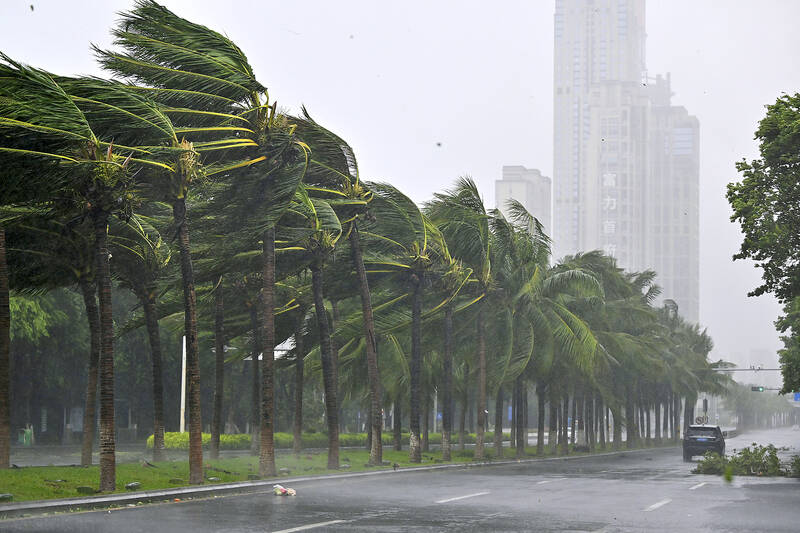Super Typhoon Yagi yesterday slammed into southern China’s Hainan island, bringing windspeeds of more than 230kph in what is set to be the strongest storm to hit the region in more than a decade.
Hainan Province evacuated more than 400,000 people ahead of the storm’s expected landfall, while tens of thousands prepared to seek shelter in neighboring Vietnam.
Yagi killed at least 13 people in the Philippines this week when it was still classified as a tropical storm, triggering floods and landslides on the main island of Luzon, before strengthening into a super typhoon over the past few days.

Photo: Xinhua via AP
The storm made landfall in China yesterday along the coast of Hainan, a popular holiday destination, and neighboring Guangdong Province at 4:20pm, Xinhua news agency reported, citing authorities.
In Hong Kong, a typhoon warning that had been in effect was lowered shortly after noon following heavy rains overnight as Yagi passed within 400km of the territory. Trading at the Hong Kong Stock Exchange was suspended yesterday and schools were closed.
Authorities said five people were injured in the territory due to the weather, but damage was limited.
Southern China is frequently hit during summer and autumn by typhoons that form in the warm oceans east of the Philippines and then travel west.
However, climate change has made tropical storms more unpredictable and increased their intensity, leading to heavy rains and violent gusts that cause flash floods and coastal damage, experts say.
Yagi is to head toward Vietnam after moving through southern China, on course to hit the northern and north-central regions around the famed UNESCO heritage site Halong Bay today.
The Vietnamese Ministry of Defense said that more than 457,000 personnel from the army, police and other forces had been put on standby.
Authorities have announced plans to close four northern airports, including Hanoi’s main international hub Noi Bai, for several hours today, while all coastal cities and provinces put sailing bans in place yesterday.
Residents in the northern port of Hai Phong and the capital, Hanoi, were stocking up on food and other necessities.
Tourist boats in Ha Long Bay had been brought ashore or taken into shelters.
Pham Quang Quyen, a resident of Quang Ninh Province, said from Tuan Chau island that he had never experienced such a typhoon warning in nearly two decades.
“I hope we will survive the typhoon as we have been very well prepared,” Quyen said.
“We are all very much used to dealing with storms and heavy rains here,” he said.

WAITING GAME: The US has so far only offered a ‘best rate tariff,’ which officials assume is about 15 percent, the same as Japan, a person familiar with the matter said Taiwan and the US have completed “technical consultations” regarding tariffs and a finalized rate is expected to be released soon, Executive Yuan spokeswoman Michelle Lee (李慧芝) told a news conference yesterday, as a 90-day pause on US President Donald Trump’s “reciprocal” tariffs is set to expire today. The two countries have reached a “certain degree of consensus” on issues such as tariffs, nontariff trade barriers, trade facilitation, supply chain resilience and economic security, Lee said. They also discussed opportunities for cooperation, investment and procurement, she said. A joint statement is still being negotiated and would be released once the US government has made

NEW GEAR: On top of the new Tien Kung IV air defense missiles, the military is expected to place orders for a new combat vehicle next year for delivery in 2028 Mass production of Tien Kung IV (Sky Bow IV) missiles is expected to start next year, with plans to order 122 pods, the Ministry of National Defense’s (MND) latest list of regulated military material showed. The document said that the armed forces would obtain 46 pods of the air defense missiles next year and 76 pods the year after that. The Tien Kung IV is designed to intercept cruise missiles and ballistic missiles to an altitude of 70km, compared with the 60km maximum altitude achieved by the Missile Segment Enhancement variant of PAC-3 systems. A defense source said yesterday that the number of

‘CRUDE’: The potential countermeasure is in response to South Africa renaming Taiwan’s representative offices and the insistence that it move out of Pretoria Taiwan is considering banning exports of semiconductors to South Africa after the latter unilaterally downgraded and changed the names of Taiwan’s two representative offices, the Ministry of Foreign Affairs (MOFA) said yesterday. On Monday last week, the South African Department of International Relations and Cooperation unilaterally released a statement saying that, as of April 1, the Taipei Liaison Offices in Pretoria and Cape Town had been renamed the “Taipei Commercial Office in Johannesburg” and the “Taipei Commercial Office in Cape Town.” Citing UN General Assembly Resolution 2758, it said that South Africa “recognizes the People’s Republic of China (PRC) as the sole

Taiwanese exports to the US are to be subject to a 20 percent tariff starting on Thursday next week, according to an executive order signed by US President Donald Trump yesterday. The 20 percent levy was the same as the tariffs imposed on Vietnam, Sri Lanka and Bangladesh by Trump. It was higher than the tariffs imposed on Japan, South Korea and the EU (15 percent), as well as those on the Philippines (19 percent). A Taiwan official with knowledge of the matter said it is a "phased" tariff rate, and negotiations would continue. "Once negotiations conclude, Taiwan will obtain a better